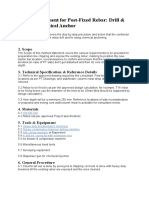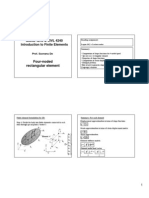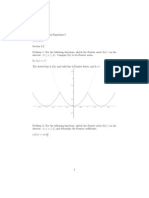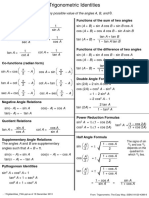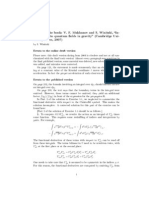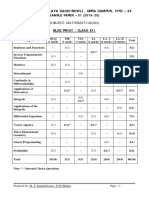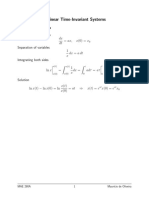En0175 03
En0175 03
Uploaded by
lsatchithananthanCopyright:
Available Formats
En0175 03
En0175 03
Uploaded by
lsatchithananthanOriginal Description:
Original Title
Copyright
Available Formats
Share this document
Did you find this document useful?
Is this content inappropriate?
Copyright:
Available Formats
En0175 03
En0175 03
Uploaded by
lsatchithananthanCopyright:
Available Formats
EN0175
09 / 12 / 06
Intro to FEM (continued) Examples of using FEM to solve a problem and comparison with exact solution: We consider a problem already discussed in the previous class:
x
g
Solution by exact method:
x (L x ) 2E g (L 2 x ) = 2 u=
u
gL
2
0
0
L 2
L 2
gL
2
Now we will solve the same problem by FEM: In FEM, the displacement is discretized as u ( x) = reduced to algebraic equation:
u
k =1
wk ( x) and the governing equation is
KU = F or
where K jk =
K
k =1
jk
uk = Fj
L
L 0
' (x )dx , F j = f w j (x ) dx = g w j (x ) dx (see notes of E w'j ( x )wk L 0 0
EN0175
09 / 12 / 06
previous lecture). FEM nodes:
wj
1
j 1 j j + 1
x x j 1 , x x j 1 , x j x x j j 1 x j +1 x , x x j , x j +1 w j (x ) = x j +1 x j 0, otherwise
] ]
Case study 1: In the simplest possible case, we choose only one node, i.e. n = 1 . In this case, we have one node and 2 elements.
L/2
u ( x ) = u1w1 ( x )
x ,0< x< L 2 L2 w1 ( x ) = Lx ,L 2< x< L L2
2 L,0< x< L 2 w1' ( x ) = 2 , L 2 < x < L L 0, otherwise
2
EN0175
09 / 12 / 06
K11u1 = F1
L L 2 E 2 K11 = E w1' ( x )dx = E dx = 4 0 0 L L 2
F1 = g w1 ( x ) dx =
L 0
gL
2
u1 =
gL2 F1 = K11 8E
u=
g
2E
x(L x )
0
Exact solution:
L 2
g L
L gL2 L = 2E 2 2 8E
u (x = L 2) =
FEM solution for stress:
( x ) = Eu ' (x ) = Eu1 w1' ( x ) =
=
2 Eu1 / L, 0 < x < L 2 2 Eu1 / L, L 2 < x < L
gL 1, 0 < x < L 2
4 1, L 2 < x < L
EN0175
09 / 12 / 06
integration points
Remarks: 1.
FEM = (x ) element (Stress calculated using FEM corresponding to an average of stress over
an element). 2. Stress is not well defined at the nodal points (taking on different values depending on which side of the node). It is better to evaluate stress at integration points. Case study 2: With slightly more sophistication and still within the possibility of doing calculation by hand, we can choose two nodes n = 2 .
L 3
2L 3
u ( x ) = u1w1 ( x ) + u2 w2 ( x )
x 0, 2 L / 3 < x < L ,0< x<L 3 L3 x L 3 , L 3 < x < 2L 3 w1 ( x ) = 2 L 3 x , L 3 < x < 2 L 3 , w2 ( x ) = L 3 L3 Lx , 2L 3 < x < L 0, 2 L / 3 < x < L L3
EN0175
09 / 12 / 06
3 L , (0, L 3) 3 w1' (x ) = , (L 3 , 2 L 3) , L 0 , (2 L 3 , L )
0, (0, L 3) 3 ' (x ) = w2 , ( L 3 , 2 L 3) L 3 , (2 L 3 , L ) L
w1
w2
K K = 11 K 21
L
K12 K 22
'2 1 2L 3 0
K11 = E w ( x )dx =
0 L 2
6E 3 E dx = L L 6E 3 E dx = L L
2L 3 L3 2
' (x )dx = K 22 = E w2 0
L L3
' (x )dx = K12 = E w1' ( x )w2 L 0
3E 3 3 = K 21 E dx = L L L
K=
3E 2 1 L 1 2
(Comment: The stiffness matrix is highly banded and sparse, and in some cases can be easily determined. If n = 100 for the present problem, we can extract the above calculations to determine
EN0175
09 / 12 / 06
2 1 1 2 1 K = Cn 1 2 O 1 O O 1 2
Nodal forces: F1 = F2 =
gL
3
KU = F
3E 2 1 u1 gL 1 = 3 1 L 1 2 u 2 2 u1 gL 1 2 1 1 gL2 1 = = 9 E 1 9E 3 1 2 1 u 2
u1 = u2 =
gL2
9E
Exact solution:
u ( x = L 3) =
g L
L gL2 L = 2E 3 3 9E
u ( x = 2 L 3) =
g 2L
2 L gL2 = L 2E 3 3 9E
EN0175
09 / 12 / 06
u=
g
2E
x(L x )
0
FEM solution for stress:
' (x ) (x ) = Eu ' (x ) = Eu1w1' (x ) + Eu2 w2
gL 2 gL 3
integration points
Brief overview of FEM in 2D and 3D (read course notes Section 1.2 on the web):
EN0175
09 / 12 / 06
Node number (integer); Nodal displacement (vector); (can also include other physical quantities e.g. temperature, pressure, etc.) Elements: associated with a number of nodes; Element connectivity; Type of elements: Linear elements: Quadratic elements:
3 nodal triangle (linear)
6 nodal triangle
w( x, y ) = a1 + a 2 x + a3 y
w( x, y ) = a1 + a 2 x + a34 y + a 4 xy + a 5 x 2 + a 6 y 2
You might also like
- Numerical Methods For Scientists and Engineers - K. S. RaoDocument123 pagesNumerical Methods For Scientists and Engineers - K. S. RaovirulandNo ratings yet
- Project 1Document13 pagesProject 1sunjeevNo ratings yet
- Method Statement For Post RebarDocument3 pagesMethod Statement For Post Rebarlsatchithananthan100% (2)
- Sol03 Landau LevelsDocument8 pagesSol03 Landau LevelsPrashant SharmaNo ratings yet
- Partial Differential EquationDocument9 pagesPartial Differential EquationEng Shakir H100% (2)
- Jehle and Reny SolutionsDocument33 pagesJehle and Reny SolutionsKevin Andrew80% (10)
- The Harmonic Oscillator: B (MagneticDocument19 pagesThe Harmonic Oscillator: B (MagneticsamuelifamilyNo ratings yet
- Assignment 1Document18 pagesAssignment 1Rubayet ShafinNo ratings yet
- 4 Node QuadDocument7 pages4 Node QuadSachin KudteNo ratings yet
- HW 1 SolutionDocument11 pagesHW 1 SolutionRohit MundatNo ratings yet
- MANE 4240 & CIVL 4240 Introduction To Finite Elements: Shape Functions in 1DDocument29 pagesMANE 4240 & CIVL 4240 Introduction To Finite Elements: Shape Functions in 1DPrayag ParekhNo ratings yet
- ME4213 Tutorial 2bDocument4 pagesME4213 Tutorial 2bLinShaodunNo ratings yet
- Lectures #8 & #9Document30 pagesLectures #8 & #9BOBNo ratings yet
- Chapter 12 Numerical Simulation: The Stream Function - Vorticity MethodDocument22 pagesChapter 12 Numerical Simulation: The Stream Function - Vorticity Methodbhassan 2007No ratings yet
- Homework 5Document7 pagesHomework 5Ale GomezNo ratings yet
- The Non Linear Advection Equation (Inviscid Burgers Equation)Document6 pagesThe Non Linear Advection Equation (Inviscid Burgers Equation)linoNo ratings yet
- x d y dx x dy dx x α y=0Document15 pagesx d y dx x dy dx x α y=0oomganapathiNo ratings yet
- Pufem 1D IDocument8 pagesPufem 1D Ielgheryb_choukriNo ratings yet
- Some Soultions (CH.1-CH4)Document26 pagesSome Soultions (CH.1-CH4)tmac011No ratings yet
- Advanced Engineering MathematicsDocument21 pagesAdvanced Engineering MathematicsSilambarasan VeluchamyNo ratings yet
- Preguntas Resueltas PDFDocument46 pagesPreguntas Resueltas PDFJustin BullockNo ratings yet
- 2.57 Nano-to-Macro Transport Processes Fall 2004: F M F F FDocument5 pages2.57 Nano-to-Macro Transport Processes Fall 2004: F M F F FcaptainhassNo ratings yet
- 1 Crank-Nicholson Algorithm: Übungen Zur Computational Nanoscience Blatt 5Document4 pages1 Crank-Nicholson Algorithm: Übungen Zur Computational Nanoscience Blatt 5140557No ratings yet
- Solutions21 3Document8 pagesSolutions21 3Mohamed1994No ratings yet
- HW4 Solutions ECE Mark Lundstrom Purdue UniversityDocument16 pagesHW4 Solutions ECE Mark Lundstrom Purdue University0307aliNo ratings yet
- Instructor Dr. Karuna Kalita: Finite Element Methods in Engineering ME 523Document40 pagesInstructor Dr. Karuna Kalita: Finite Element Methods in Engineering ME 523Nitesh SinghNo ratings yet
- Midterm One 6711 F10 SolsDocument8 pagesMidterm One 6711 F10 SolsSongya PanNo ratings yet
- Soluition of Assignment 2 Summer 2011Document11 pagesSoluition of Assignment 2 Summer 2011Ruishan Liu100% (1)
- Durbin LevinsonDocument7 pagesDurbin LevinsonNguyễn Thành AnNo ratings yet
- Power System Analysis II: Instructor: E-Mail: Office PhoneDocument66 pagesPower System Analysis II: Instructor: E-Mail: Office PhoneSelah TalepNo ratings yet
- 1-Dim Quantum Mechanics AllDocument12 pages1-Dim Quantum Mechanics AllNasser AlkharusiNo ratings yet
- Numerical Methods: Marisa Villano, Tom Fagan, Dave Fairburn, Chris Savino, David Goldberg, Daniel RaveDocument44 pagesNumerical Methods: Marisa Villano, Tom Fagan, Dave Fairburn, Chris Savino, David Goldberg, Daniel RaveSanjeev DwivediNo ratings yet
- Px A B Reab kx AB kx: = = + + + ψ ψ * - - - - (*) cos Im (*) sin 2 2 2 2 1 2 4 4 3 44 1 2 4444444 3 4444444Document10 pagesPx A B Reab kx AB kx: = = + + + ψ ψ * - - - - (*) cos Im (*) sin 2 2 2 2 1 2 4 4 3 44 1 2 4444444 3 4444444liznNo ratings yet
- PDFDocument7 pagesPDFAliOucharNo ratings yet
- (FREE PDF Sample) Optimization Models Instructor S Solution Manual Solutions 1st Edition Giuseppe C. Calafiore EbooksDocument84 pages(FREE PDF Sample) Optimization Models Instructor S Solution Manual Solutions 1st Edition Giuseppe C. Calafiore Ebookshotboxjuansa100% (6)
- MANE 4240 & CIVL 4240 Introduction To Finite Elements: Shape Functions in 1DDocument29 pagesMANE 4240 & CIVL 4240 Introduction To Finite Elements: Shape Functions in 1DSanapala AmitNo ratings yet
- Calculus of Variations ExamplesDocument7 pagesCalculus of Variations ExamplesBrianWeathersNo ratings yet
- 3SLS LectureDocument20 pages3SLS Lectureseema dokrimareNo ratings yet
- Advanced Fluid Mechanics - Chapter 05 - Boundary Layer TheoryDocument33 pagesAdvanced Fluid Mechanics - Chapter 05 - Boundary Layer Theorysunil481No ratings yet
- Ch5 - Response of MDOF Systems PDFDocument37 pagesCh5 - Response of MDOF Systems PDFRicky AriyantoNo ratings yet
- Special FunctionsDocument39 pagesSpecial FunctionsAakash NairNo ratings yet
- Principles of Least SquaresDocument44 pagesPrinciples of Least SquaresdrdahmanNo ratings yet
- Curvve Fitting - Least Square MethodDocument45 pagesCurvve Fitting - Least Square Methodarnel cabesasNo ratings yet
- Homework 7Document7 pagesHomework 7Ale Gomez100% (5)
- Lesson 5 For AeronauticalDocument28 pagesLesson 5 For AeronauticalprannenbatraNo ratings yet
- The Normal and Lognormal Distributions: John NorstadDocument14 pagesThe Normal and Lognormal Distributions: John NorstadkalichkoNo ratings yet
- 2021 Assignment 5Document2 pages2021 Assignment 5Sai naveenNo ratings yet
- Hans Lundmark - Peakons and Shockpeakons in The Degasperis-Procesi EquationDocument34 pagesHans Lundmark - Peakons and Shockpeakons in The Degasperis-Procesi Equation23213mNo ratings yet
- Vibrations of StructuresDocument9 pagesVibrations of StructuresRafaAlmeidaNo ratings yet
- Vim MethodDocument7 pagesVim MethodLaksh MananNo ratings yet
- M Ethode Des El Ements FinisDocument18 pagesM Ethode Des El Ements FinisAbdellahFreemanNo ratings yet
- Physics 9C Midterm 2 SolutionsDocument7 pagesPhysics 9C Midterm 2 SolutionsTiffany LeeNo ratings yet
- EulerDocument2 pagesEulerFayazKhanPathanNo ratings yet
- Lognormal and Normal DistributionsDocument14 pagesLognormal and Normal DistributionsKam Fong ChanNo ratings yet
- 125Document19 pages125Shailendra AgarwalNo ratings yet
- PDE HW Chap 3Document9 pagesPDE HW Chap 3ammar_harb100% (1)
- Particle in A BoxDocument9 pagesParticle in A BoxVibhu MittalNo ratings yet
- ENG2005 Workshop W11-2Document11 pagesENG2005 Workshop W11-2liamlast2102No ratings yet
- 5 5weDocument7 pages5 5weJhonatan AguirreNo ratings yet
- Lecture 8Document13 pagesLecture 8Prakash KancharlaNo ratings yet
- Mathematics 1St First Order Linear Differential Equations 2Nd Second Order Linear Differential Equations Laplace Fourier Bessel MathematicsFrom EverandMathematics 1St First Order Linear Differential Equations 2Nd Second Order Linear Differential Equations Laplace Fourier Bessel MathematicsNo ratings yet
- Green's Function Estimates for Lattice Schrödinger Operators and ApplicationsFrom EverandGreen's Function Estimates for Lattice Schrödinger Operators and ApplicationsNo ratings yet
- Application of Derivatives Tangents and Normals (Calculus) Mathematics E-Book For Public ExamsFrom EverandApplication of Derivatives Tangents and Normals (Calculus) Mathematics E-Book For Public ExamsRating: 5 out of 5 stars5/5 (1)
- kwik-ZIP HD Installation GuideDocument2 pageskwik-ZIP HD Installation GuidelsatchithananthanNo ratings yet
- 2ft Curb and Gutter Asphalt Pavement Detail (S-7)Document1 page2ft Curb and Gutter Asphalt Pavement Detail (S-7)lsatchithananthanNo ratings yet
- Lifting OperationsDocument1 pageLifting OperationslsatchithananthanNo ratings yet
- Concrete Arch Pipe Reinforcement Detail (S-51)Document1 pageConcrete Arch Pipe Reinforcement Detail (S-51)lsatchithananthanNo ratings yet
- Method Statement For ConstructionDocument2 pagesMethod Statement For ConstructionlsatchithananthanNo ratings yet
- Construction HazardsDocument2 pagesConstruction HazardslsatchithananthanNo ratings yet
- Graphs To Calculate Settlement - Calculation of Pile Base Settlement - GEO5 - Online HelpDocument4 pagesGraphs To Calculate Settlement - Calculation of Pile Base Settlement - GEO5 - Online HelplsatchithananthanNo ratings yet
- PLEM Design Methodology - OilfieldWikiDocument4 pagesPLEM Design Methodology - OilfieldWikilsatchithananthanNo ratings yet
- Pengurusan Air Selangor SDN BHD (1082296-U) : Form Ka 1/1Document4 pagesPengurusan Air Selangor SDN BHD (1082296-U) : Form Ka 1/1lsatchithananthanNo ratings yet
- Pengurusan Air Selangor Sdn. Bhd. KA 1/2 (Rev - 2019) : Part ADocument10 pagesPengurusan Air Selangor Sdn. Bhd. KA 1/2 (Rev - 2019) : Part AlsatchithananthanNo ratings yet
- Calculation of Pile Base Settlement - Analyses From CPTs - GEO5 - Online HelpDocument3 pagesCalculation of Pile Base Settlement - Analyses From CPTs - GEO5 - Online HelplsatchithananthanNo ratings yet
- Centralizer & Spacer Systems: For The Drilling & Civil Construction IndustriesDocument3 pagesCentralizer & Spacer Systems: For The Drilling & Civil Construction IndustrieslsatchithananthanNo ratings yet
- TNB Door - Vicmeta SDN BHDDocument5 pagesTNB Door - Vicmeta SDN BHDlsatchithananthanNo ratings yet
- Plem Design and Analysis - OilfieldWikiDocument4 pagesPlem Design and Analysis - OilfieldWikilsatchithananthanNo ratings yet
- Typical Reinforcement Details of A Cantilever SlabDocument1 pageTypical Reinforcement Details of A Cantilever SlablsatchithananthanNo ratings yet
- 2020 ESAH Complete v3.1Document130 pages2020 ESAH Complete v3.1lsatchithananthanNo ratings yet
- Pile Capacity (Pile Cap - BS 8110) PDFDocument1 pagePile Capacity (Pile Cap - BS 8110) PDFlsatchithananthanNo ratings yet
- Checks For Limiting Parameters (Pile Cap - BS 8110)Document1 pageChecks For Limiting Parameters (Pile Cap - BS 8110)lsatchithananthanNo ratings yet
- AS 2159 & 3600 Concrete Pile Design - SkyCiv Cloud Structural Analysis SoftwareDocument10 pagesAS 2159 & 3600 Concrete Pile Design - SkyCiv Cloud Structural Analysis SoftwarelsatchithananthanNo ratings yet
- Tolerances of Errors in Pile Foundation ConstructionDocument3 pagesTolerances of Errors in Pile Foundation ConstructionlsatchithananthanNo ratings yet
- Effective Depth of Section (Beams - BS 8110)Document1 pageEffective Depth of Section (Beams - BS 8110)lsatchithananthanNo ratings yet
- Slender Beams (Beams - BS 8110)Document1 pageSlender Beams (Beams - BS 8110)lsatchithananthanNo ratings yet
- Cover To Reinforcement (Columns - BS 8110)Document1 pageCover To Reinforcement (Columns - BS 8110)lsatchithananthanNo ratings yet
- Design Rigid Haryati 2018 PDFDocument196 pagesDesign Rigid Haryati 2018 PDFlsatchithananthanNo ratings yet
- Cover To Reinforcement (Beams - BS 8110)Document2 pagesCover To Reinforcement (Beams - BS 8110)lsatchithananthanNo ratings yet
- Calculation of Wind Loads On Structures According To ASCE 7 - 2005 Wind Load Calculation ProceduresDocument8 pagesCalculation of Wind Loads On Structures According To ASCE 7 - 2005 Wind Load Calculation ProcedureslsatchithananthanNo ratings yet
- The Dirac Equation in Rindler Space - A Pedagogical IntroductionDocument21 pagesThe Dirac Equation in Rindler Space - A Pedagogical IntroductionJohn BirdNo ratings yet
- These Equations Are True For Every Possible Value of The Angles A, B, andDocument2 pagesThese Equations Are True For Every Possible Value of The Angles A, B, andDiego Urbieta Garcia JassoNo ratings yet
- An Assignment Problem Is A Particular Case of Transportation ProblemDocument7 pagesAn Assignment Problem Is A Particular Case of Transportation ProblemsunilsinghmNo ratings yet
- $$$MGB3rdSearchable PDFDocument577 pages$$$MGB3rdSearchable PDFMarzieh Rostami100% (1)
- Alg 1 Student Edition Chapter 10Document42 pagesAlg 1 Student Edition Chapter 10onlineteacher251No ratings yet
- Winitzki - Errata 2009 To Book Quantum Fields in Curved SpacetimeDocument4 pagesWinitzki - Errata 2009 To Book Quantum Fields in Curved SpacetimewinitzkiNo ratings yet
- Section 6.4: Arc Length and Surface AreaDocument9 pagesSection 6.4: Arc Length and Surface AreaHiepNo ratings yet
- Graph Theory 1Document2 pagesGraph Theory 1Gayan AttanayakeNo ratings yet
- Maths Class Xii Sample Paper 01 For Board Exam 2020 PDFDocument5 pagesMaths Class Xii Sample Paper 01 For Board Exam 2020 PDFRajasri RsNo ratings yet
- Adobe Scan 23-Jun-2023Document25 pagesAdobe Scan 23-Jun-2023KANISHKA K BNo ratings yet
- Advanced Mathematics:: Asst. Prof. Abbas F. AL-shimmary 2012-2013Document16 pagesAdvanced Mathematics:: Asst. Prof. Abbas F. AL-shimmary 2012-2013roseNo ratings yet
- Pictorial Presentation Is Given: Draw Three Views of This Object by First Angle Projection MethodDocument7 pagesPictorial Presentation Is Given: Draw Three Views of This Object by First Angle Projection MethodsridharanNo ratings yet
- Lesson 3: Basic Theory of Stochastic Processes: Umberto TriaccaDocument30 pagesLesson 3: Basic Theory of Stochastic Processes: Umberto TriaccalalaouiNo ratings yet
- Digital Image Processing QuestionsDocument7 pagesDigital Image Processing Questionsvicky_ani1986No ratings yet
- Class Xii Case Based Relation & FunctionDocument11 pagesClass Xii Case Based Relation & FunctionAshish Kumar NigamNo ratings yet
- As Mathematics Pure 2Document7 pagesAs Mathematics Pure 2kamrunnisaNo ratings yet
- 3 Beam AnalysisDocument15 pages3 Beam AnalysisSteven KuaNo ratings yet
- Irregular Boundary Area Computation by Quantic HerDocument11 pagesIrregular Boundary Area Computation by Quantic HeribrahimNo ratings yet
- Sequences and Series: Section - ADocument23 pagesSequences and Series: Section - AspectarNo ratings yet
- Claret College of IsabelaDocument5 pagesClaret College of IsabelaEmamMsHome-hyhyNo ratings yet
- Euler Angles - Wikipedia, The Free EncyclopediaDocument8 pagesEuler Angles - Wikipedia, The Free Encyclopediaangmas1962No ratings yet
- Normal Operators, The Spectral Theorems, Isometries, and Positive OperatorsDocument6 pagesNormal Operators, The Spectral Theorems, Isometries, and Positive OperatorsEdgar MarcaNo ratings yet
- Hermite Curve HandoutDocument2 pagesHermite Curve HandoutRicardo DíazNo ratings yet
- Investigation: Graphing Implicit Functions On A TI-89Document5 pagesInvestigation: Graphing Implicit Functions On A TI-89Francisco SanchesNo ratings yet
- CC Algebra I - Chapter 5.2.3Document3 pagesCC Algebra I - Chapter 5.2.3wuisgonzNo ratings yet
- 1 Solution To Linear Time-Invariant Systems: MAE 280A 1 Maur Icio de OliveiraDocument11 pages1 Solution To Linear Time-Invariant Systems: MAE 280A 1 Maur Icio de OliveirabzuiaoqNo ratings yet


